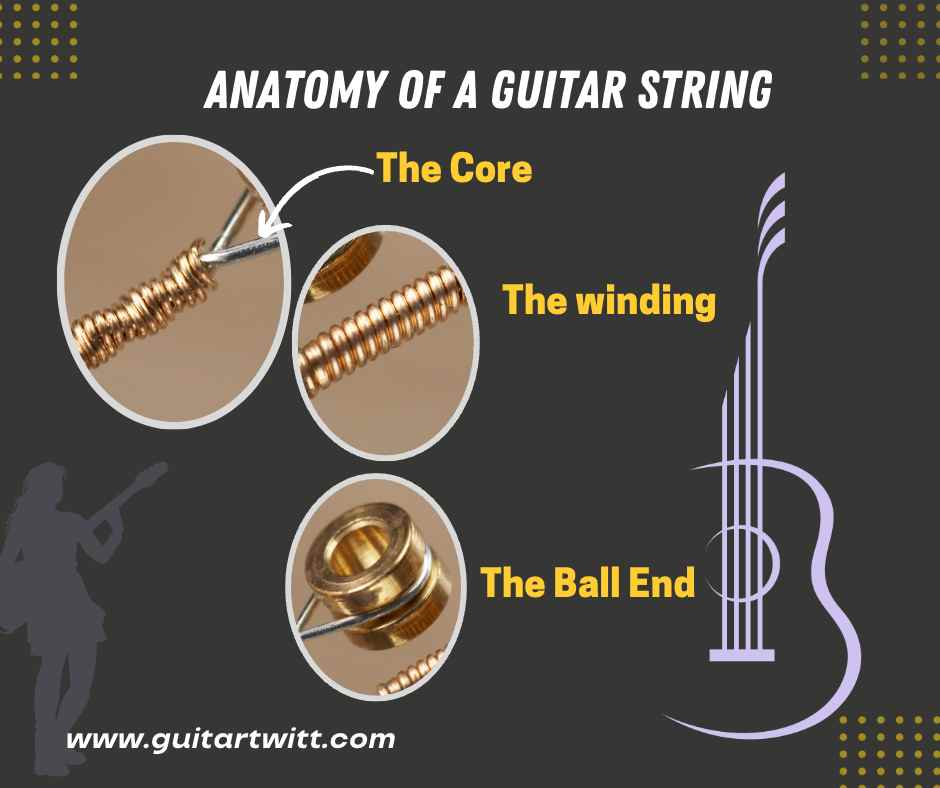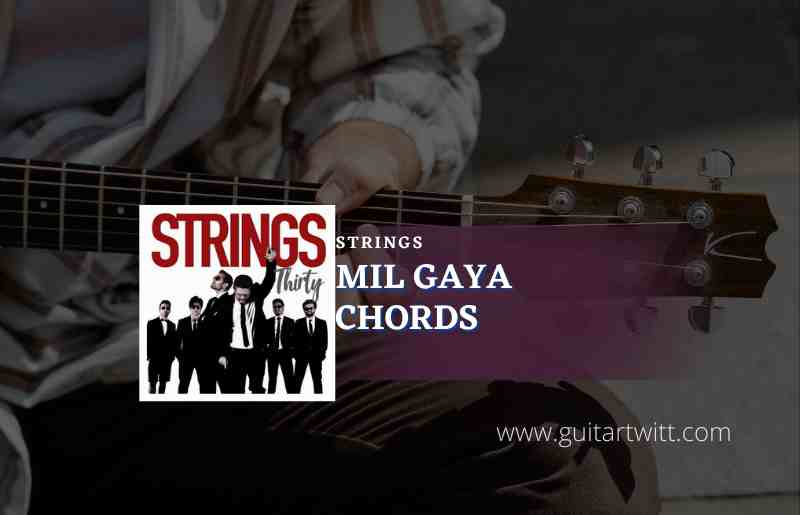As a guitarist, selecting the proper strings is essential to attaining the desired sound and maximizing your instrument. This article will walk you through the various varieties of guitar strings, how to comprehend their anatomy, and purchasing considerations. At the conclusion of this article, you will be able to confidently know how to choose the right strings for your guitar.

Why Choosing the Right Strings is Important
Choosing the right strings affects your tone, playability, and overall enjoyment of the instrument. The wrong strings can make playing difficult, produce unwanted tonal characteristics, and even damage your guitar.
How This Article Will Help You Choose the Right Strings
Choosing the appropriate guitar strings is crucial, and we’ll explain their anatomy, different varieties, and gauges in detail to assist you. In addition, we will present a comprehensive analysis of the various elements you should weigh before making a final decision.
Understanding Guitar Strings

Anatomy of a Guitar String: A guitar string consists of three main parts: the core, the winding, and the ball end. The core is the central part of the string, made of a high-carbon steel wire. The winding is wrapped around the core and is made of various materials, such as nickel, bronze, or steel. The ball end is attached to the winding and ensures the string stays in place.
- Types of Guitar Strings: Acoustic, electric, classical, and bass are the four primary varieties of guitar strings. Each type has its own unique characteristics and is designed for specific types of playing.
- Gauge and Tension: Gauge refers to the string’s thickness, which influences the required tension to perform the string. The wider the gauge, the thicker the string, and the greater the playing tension required.
- Winding Materials and Coatings: Winding materials and coatings are important factors to consider when choosing guitar strings. They affect the sound, feel, and durability of the strings.
- String Materials: String materials also affect the sound and playability of your guitar. The most common materials include steel, nylon, and silk. Each material produces a different sound and feel.
Finding Your Sound
Tone
Tone is personal and can be influenced by the materials used in your instrument’s strings, how you play, and the guitar you’re using. It’s important to try out different strings gauges and brands to find the tone that fits your way of playing and musical tastes.
Playing Style
Your playing style is also an important factor to consider when choosing strings. Different playing styles require different types of strings and gauges.
Musical Genre
The genre of music you play can also impact the strings you choose. Blues and jazz, for example, require strings with a warmer tone, whereas rock and metal may require strings with a livelier tone.
Guitar Type
Different types of guitars require different types of strings. Acoustic guitars typically use bronze or steel strings, while classical guitars require nylon strings. Electric guitars use steel strings.
Desired Volume
If you need your guitar to be loud and cut through a mix, you may want to consider heavier gauge strings. If you prefer a softer, more delicate sound, lighter gauge strings may be more suitable.
Factors to Consider Before Buying Strings
Budget
There are strings available at different price points, from affordable to high-end. It’s important to consider how often you play and your budget when selecting strings.
Frequency of Playing
If you play frequently, you may need to change your strings more often. This can lead to higher costs if you opt for expensive strings.
Availability
Some types of strings may be harder to find than others. It’s important to consider availability if you plan on touring or playing in different areas.
Personal Preferences
Regarding string preferences, each person has their own preferences. Experimenting with several kinds of strings is necessary in order to find the ones that have the most desirable feel and sound for a specific guitar.
Quality vs. Price
It is crucial to consider your budget, but you should also remember that strings of higher quality may last longer and sound better.
Choosing the Right Types of Strings
- Acoustic Guitar Strings: Acoustic guitar strings are available in a variety of materials, including phosphor bronze, 80/20 bronze, silk and steel, and coated strings.
- Electric Guitar Strings: Electric guitar strings come in nickel-plated steel, stainless steel, pure nickel, and coated strings.
- Classical Guitar Strings: Classical guitar strings typically come in nylon or nylon wrapped around a core.
- Bass Guitar Strings: Bass guitar strings come in round-wound, flat-wound, half-wound, and coated strings.
Gauges and Tension
- Light Gauge: Light gauge strings are easier to play but may lack some of the volume and tone of heavier gauge strings.
- Medium Gauge: Medium gauge strings are a good all-around choice for most players.
- Heavy Gauge: Heavy gauge strings require more tension to play but produce a fuller, richer tone.
- Extra-light Gauge: Extra-light gauge strings are the easiest to play but may produce a less full sound.
Tension
Tension refers to the amount of force required to play a string. Higher gauge strings require more tension to play.
String Winding Materials
- Roundwound Strings: Roundwound strings have a bright tone and are popular among rock and metal players.
- Flatwound Strings: Flatwound strings have a warm, smooth tone and are often used by jazz players.
- Halfwound Strings: Halfwound strings have a balanced tone between round-wound and flat-wound strings.
- Tape-wound Strings: Tape-wound strings are similar to flat-wound strings but produce a more distinct tone.
- Pressure-wound Strings: Pressure-wound strings are a hybrid of round-wound and flat-wound strings, producing a unique, complex tone.
Coated Strings
Advantages: Coated strings can last longer and are more resistant to corrosion and sweat.
Disadvantages: Coated strings can produce a slightly muted tone and are often more expensive than uncoated strings.
Types of Coatings
Coatings can include:
- Nanoweb,
- Poly web, and
- Coated phosphor bronze.
String Maintenance
- Cleaning: Regular cleaning can help prolong the life of your strings and improve their overall sound.
- Changing Strings: It’s important to change your strings regularly to avoid breakage and poor tone.
- String Breakage: String breakage can occur due to factors such as playing style, string tension, and the age of the string.
ALSO READ: 10 Best Acoustic Strings 2023
FAQ’S
Can I Mix and Match String Gauges?
It’s generally not recommended to mix and match string gauges, as this can lead to an uneven tone and tension across the strings.
How Often Should I Change My Guitar Strings?
It’s recommended to change your guitar strings every 3-4 months with regular playing.
Should I Change All Strings at Once or One at a Time?
It’s generally recommended to change all strings at once, as this ensures consistent tone across all strings.
Do Coated Strings Sound the Same as Uncoated Strings?
Coated strings can produce a slightly muted tone compared to uncoated strings, but this can vary depending on the coating used.
Can I Use Electric Guitar Strings on an Acoustic Guitar?
Electric guitar strings are not recommended for acoustic guitars, as they require a magnetic pickup to amplify the sound properly.
Conclusion strings to find the ones that feel and sound best for you and your playing style.
Choosing the proper strings is essential to attaining the desired sound and maximizing the performance of your guitar. Knowledge of guitar string anatomy, available options, and purchasing considerations can help you make a well-informed decision. Remember to experiment with different


